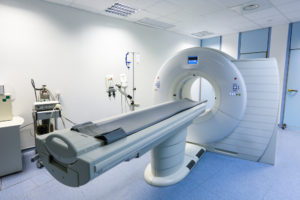 When you have an injury or issue that affects your internal structures then your doctor may want you to get an MRI scan. Whether you have recently been injured or have lingering pain from an old injury, an MRI scan can provide your doctor with a much clearer visual of the affected area so they can determine the most accurate diagnosis. Unlike an X-ray that only provides a two-dimensional image of your bones or joints, an MRI scan provides highly detailed images of your internal structures, including your bones, joints, muscles, organs, nerves, and other soft tissues.
When you have an injury or issue that affects your internal structures then your doctor may want you to get an MRI scan. Whether you have recently been injured or have lingering pain from an old injury, an MRI scan can provide your doctor with a much clearer visual of the affected area so they can determine the most accurate diagnosis. Unlike an X-ray that only provides a two-dimensional image of your bones or joints, an MRI scan provides highly detailed images of your internal structures, including your bones, joints, muscles, organs, nerves, and other soft tissues.
Your doctor may utilize an MRI scan to help inform their treatment plan so they can be sure to address all the injured or damaged areas and set you on a path toward healing and recovery. An MRI scan stands for “magnetic resonance imaging”, which means it uses complex technologies that involve magnets and radio waves to take cross-sectional three-dimensional images of your internal structure. An MRI scan doesn’t expose you to any radiation and can provide your doctor with the most accurate assessment of how an injury or issue is affecting your body.
What Is a Traditional MRI Scan?
You might be familiar with the traditional MRI scan from television or movies, where a patient lies on a table that is then inserted into a giant, tube-like structure. A doctor is available behind a glass partition and walks the patient through the process, including instructions on when to move and when not to move. If you’ve ever had an X-ray or CT scan, then you know these can happen in just a few minutes. However, those types of diagnostic imaging tools do use radiation and are not as detailed as an MRI scan. Additionally, a traditional MRI scan can take up to an hour, depending on the area your doctor wishes to assess in greater detail.
The Difference Between Open and Closed MRIs
The traditional MRI scan is known as a closed MRI, which refers to the tube-like structure where the images are taken. A closed MRI is the most common type of MRI scan and the most widely available option. Some people who struggle with a fear of enclosed spaces may struggle with a closed MRI, and there are certain size and weight limitations for closed MRI scans. The open MRI was developed as an alternate option to the closed MRI, though it does have its limitations as well. An open MRI can only be used for certain areas of the body and sometimes a closed MRI is recommended for a more accurate diagnostic assessment. However, the technological advancements of MRI scans have led to a much more comfortable experience for patients.
The Difference Between Standing and Sitting MRIs
Unlike the traditional MRI where you are lying on a table that is inserted into the MRI machine, there have been additional advancements in MRI technologies that have made sitting or standing possible in certain cases. An open, upright MRI scan can be a recommended or preferred option for people who struggle with claustrophobia or who are unable to undergo the traditional MRI scan due to pain or size. No matter whether you are lying down, standing, or sitting, MRI scans are loud and noisy, so you will typically be offered headphones or earplugs to help dampen the noise.
Why Schedule an MRI with Contrast?
In some circumstances, your doctor may also request an MRI scan with contrast. This type of MRI scan is typically requested when your doctor needs a more detailed look at inflammation, organ function, a tumor, or blood flow. An MRI with contrast means you will be injected with a contrast dye that will help certain parts of the body show up better in the images. The dye will circulate through your blood, which can show how well your blood is flowing, and can also be absorbed into certain tissues, which helps them to stand out better. An MRI with contrast typically lasts 30 minutes to an hour, which is similar to a traditional MRI scan and depends on what area is being assessed.
With so many to choose from, how do you choose the right chiropractor in Tucker? At AICA Orthopedics in Tucker, we offer a multi-specialty approach to your treatment and care with our team of orthopedic doctors, surgeons, chiropractors, physical therapists, and neurologists. We also offer a unique experience of having diagnostic imaging tools like MRI scans in-house, so you can meet with your doctor and get an MRI scan all in one, convenient location.
